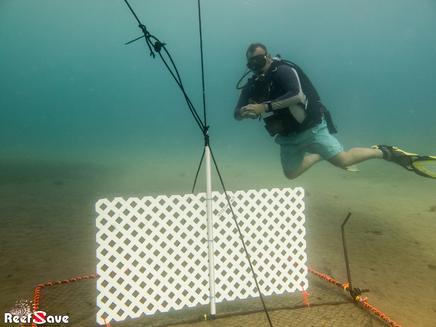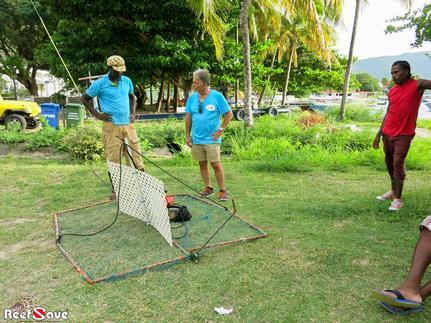The Plan
If we can't Beat'em then Let's Eat'em

History Of Concern
In a relatively short period of time, invasive Lionfish from the Pacific have expanded from an unknown source in Florida Northward up the Atlantic Coast, Southward into the Gulf of Mexico, Central America, all islands of the Caribbean even as far as Tobago, and now they are entering into Brazil and South America.
Lionfish reproduce rapidly and have no natural predators. They prey on juveniles and small reef fish dramatically affecting marine life populations. Lionfish are not susceptible to catching through angling with bait so neither traditional netting nor angling works. However, they are attracted to structure.
The reef management protocol by NOAA (United States) has evolved from waiting to see if native species would predate, to killing and leaving Lionfish on the reef, to feeding other species, to the current suggestion of removal by scuba.
However, nothing has been effective at removing Lionfish below open water limits for recreational SCUBA volunteers: Lionfish populations have been observed by submarines at 800 feet (265 meters) below the surface.
With SCUBA only, even if one cleans out the first 130 feet deep (recreational SCUBA limits), the deeper ones can simply move up or down from the depths into the good structure vacated by the removed Lionfish. We have also observed that this technique only affects regularly dived areas. Even after a removal, in non dived areas the Lionfish are everywhere.
While culling by SCUBA might be workable on a small scale it is far too costly in terms of training, supplies and equipment to be viable for long term consistent removal of lionfish that is economically self-sustaining.
For a self-sustaining solution there must be an economic model that can efficiently catch Lionfish consistently and safely. Having effective lionfish traps is seen as the solution, working in conjunction with culling since one can not drop traps on a reef.
By creating a system with economic benefits for local participates, our goal is to eventually make this self-sustaining by helping to create a new Lionfish industry where Lionfish will be as common in fish markets as flounder or lobster.
August 2018 -
August 2018 – ReefSave president is in Bequia outside the Reefsave Public Open Meeting and is speaking with local fishermen about the lionfish “Purse Trap” in front of them.
Inside the restaurant de Bistro, a public open house with: free lionfish to sample; videos of lionfish and the work done by Reefsave; appearance by former Prime Minister of St Vincent and the Grenadines, Sir James Mitchell endorsing the work of ReefSave. This is part of the public education portion of our mission.

Bequia Lionfish Trap Test Project
Phase1:
11 August – 9 September 2018
Build Traps Locally Where Resources are Limited:Study Trap Aggregation, Lionfish Behavior and Educate the Public.
STATUS: Completed – President’s Progress Report – Phase I
- Construct, test, and deploy locally Built designs of the NOAA purse trap with locally available materials and supplies
- Deploy traps at various depths and bottom environments. Make observations and collect data to assist with NOAA Fisheries approval of traps and to improve efficiency and reliability
- Monitor, film and record data for scientific analysis
- Deploy traps for study of soak times, catch and by-catch, bottom damage, drifting and entanglement with continued monitoring
- Conduct Reef.org fish count surveys at nearby reefs for baseline and ongoing monitoring
- Present educational demonstrations and videos to the public about Lionfish, safe handling, how Lionfish hurt the reef and affect fishing, how locals can help by substituting Lionfish for other imported protein in their diets, and offer free samples of cooked Lionfish for the public to taste
Phase 2:
October 2018 – December 2020
Improve Trap Efficiency and Productivity: Demonstrate Successful Business Model
STATUS: Work In Progress
- GOAL: Implement design changes to increase Trap Efficiency (Catch Rate) and work on updated designs and deployment techniques.
- Trap Building Events to test new techniques in building and modification of design January – February 2019 Completed
- In water testing in the US April – May 219 (SeeEVENTS for Info) Cancelled due to weather and will be re-scheduled – in process
- In water testing 22-29 JUN 2019 in Bequia of re-designed traps and reconditioning of traps built in 2018 to improve performanceCompleted
- Study Lionfish Behavior to increase Productivity by choosing the best deployment locations and techniques.- in process
- Develop Training Materials for volunteers and for the general public.- in process
- Hold Local Events for building traps and to train volunteers to more efficiently conduct the implementation of the plan saving both time and resources – in process
- Expand to other Islands in St. Vincent and the Grenadines – in process
- Continue reef monitoring, study and analysis for the effect of consistent removal of Lionfish from the reef and surrounding areas – in process
- Innovate with better scientific choices as information becomes available, move to electronic data collection, and work on development of cell phone software for prediction of best locations for trap deployment – in process
- Determine optimum number and placement of traps to create a successful small business for participating local fisherman who agrees to submit data and follow rules set out in the lease – in process
- Demonstrate Successful Business Model for small scale fishermen
Phase 3:
January 2021 – 2023
Use What Works: Deployment to Other Affected Areas
STATUS: Planning Stage
- Duplicate the successes of the Bequia model at other locations in the region
- Provide assistance to local governments seeking scientific assistance
- Develop expanding markets with Guarantee purchase of all catch at fixed price to local agent or fisherman can sell locally. Build local market and export excess catch through the ReefSave.org.
- Assist with education of the public so that local government or NGO fish management is acceptable by the public as they come to understand that management allows fisheries to expand and eventually increase both overall fish production and tourism from healthier reef life, creating a self-sustaining economic model that protects the long term health of the reef
